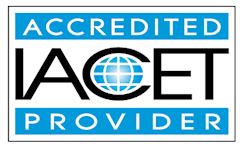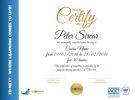Childhood Language Development
Ed-Next
Summary
- Exam(s) / assessment(s) is included in price
Overview
Children with speech, language, or listening problems can look forward to less frustration, self-doubt, and misplaced blame for their limitations if they are properly diagnosed and treated and if their family is informed and supportive. If you suspect or have been told that your child has as a speech, language, or listening problem, our course will give you a deeper understanding of the diagnoses and how to offer help for your child. Armed with knowledge, you are in a better position to help make your child’s life more fulfilling and far less challenging.
* You have 4 weeks to complete this course from date of your enrollment.
Course media
Description
After completing this course, you should be able to:
- Define the communication-learning process
- Recall the symptoms of and typical interventions for most common language problems
- Recognize auditory processing disorders and the solutions
- Identify the cause of delayed development and various interventions
Childhood Language Development Module 1
Learning to Communicate and Speech Problems
Children start on the road to successful communication as soon as they are born, but progress at different rates. Module one will look at the communication-learning process and what we can do to help children learn how to communicate. Module one will examine the most common type of speech and voice problems with an end goal of gaining a greater understanding of your child and their individual needs.
- What is Speech, Language, and Listening
- How Do Children Learn to Communicate
- Understanding Speech Problems
- Stuttering and Pronunciation Problems
- Common Voice Problems
Childhood Language Development Module 2
Understanding Language Problems
Module two will discuss the symptoms of and typical intervention for the most common language problems. We will look at how individual children are affected differently and what parents can do to help. Language problems are not at easily treated and some children will just not ever be great at conversation. However, module two will look at what improvements can be made with the right help.
- Toddlers and Preschoolers with Delayed Speech or Language
- Vocabulary Problems
- Morphological and Syntax Problems
- Word Retrieval Problem
- Social Language and Playing
Childhood Language Development Module 3
Understanding Listening Problems
A listening problem can have an impact on receptive language. In module three, we will look at the challenges faced by children with common listening problems. We review auditory processing disorders, and look at what parents can do to help children cope at home and in school.
- Auditory Processing Problem
- The Effects of a Language Processing Problem
- An Auditory Memory Problem
- Receptive Language Comprehension
- Therapy and Home Help
Childhood Language Development Module 4
Causes of Delayed Development and Therapy That Works
There isn’t a “textbook” profile of what causes delays in speech, language, and listening developments. Each child brings a set of special conditions that need addressed. Module four will look at many different causes of delayed development and will examine a variety of therapies that work for each. In this module, we will also look at how to support and encourage your child’s language development at home, in school, and in other environments.
- Abuse, Neglect and Congenital Conditions
- Cognitive Disabilities Neurobiological Disorders
- Autism, Social Behaviors, Cerebral Palsy
- Inclusion
- Therapies That Work
Ed4Online has been approved as an Accredited Provider by the International Association for Continuing Education and Training (IACET). In obtaining this accreditation, Ed4Online has demonstrated that it complies with the ANSI/IACET Standard which is recognized internationally as a standard of good practice. As a result of the Accredited Provider status, Ed4Online is authorized to offer IACET CEUs for courses and programs that qualify under the ANSI/IACET Standard.
You will earn 2.4 IACET continuing education credits by completing this Ed4Online course. This course is 24 contact hours which equals 2.4 CEUs based on the IACET standard. The International Association of Continuing Education and Training is the highest quality worldwide standard for Continuing Education Unit.
The Continuing Education Unit (CEU) was created by IACET as a measurement of continuing education. One (1) IACET CEU is equal to ten (10) contact hours of participation in an organized continuing education experience under responsible sponsorship, capable direction, and qualified instruction. Under IACET's care, the IACET CEU has evolved from a quantitative measure to a hallmark of quality training and instruction.
Who is this course for?
Anyone interested in Child development
Requirements
No prior qualification required
Career path
Application of principles learnt in this course
Reviews
Currently there are no reviews for this course. Be the first to leave a review.
Legal information
This course is advertised on reed.co.uk by the Course Provider, whose terms and conditions apply. Purchases are made directly from the Course Provider, and as such, content and materials are supplied by the Course Provider directly. Reed is acting as agent and not reseller in relation to this course. Reed's only responsibility is to facilitate your payment for the course. It is your responsibility to review and agree to the Course Provider's terms and conditions and satisfy yourself as to the suitability of the course you intend to purchase. Reed will not have any responsibility for the content of the course and/or associated materials.




